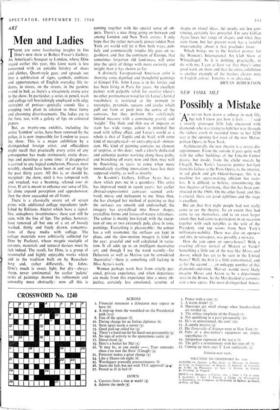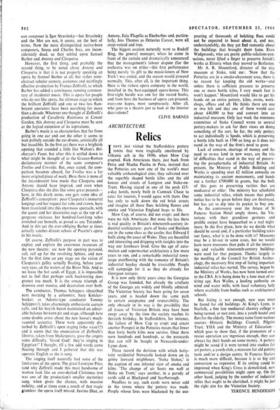Possibly a Mistake
NEW YORK MET 6A. NEVAli been doss n a subway in mah life, bvt nah I know just how it feels . . .' said a sweetly grotesque little lady encrusted with diamonds who was trying to tight her way through the richest crush in recorded times to her $250 seat at the opening last week of the new Metro- politan Opera in New York.
Architecturally the new theatre is a severe dis- appointment. From the outside it goes quite well with the other buildings of the Lincoln Center piazza, but inside, from the cliché murals by Chagall, New York's faxourite painter hot-foot from his failure at the Paris Opera, to the interior, in red plush and gilt Odeon-baroque, this is a machine for opera-making, efficient but taste- less. It is difficult to believe, remembering the new theatres of Germany, that this has been con- structed in the 1960s. On the other hand, and this is crucial, there are good sightlines and the stage is excellent.
But on that first night people had not really come to see the theatre. To an extent they had come to see themselves, and to an even larger extent they had come to participate in an occasion together with such notables as the wife of the President, and top scions from New York's millionaire-nobility. There was also an opera— and this, in retrospect, was possibly a mistake.
How do you open an opera-house? With a cracking all-star revival of Mozart or Verdi? Something a little out of the way like Moses and Aaron, which has yet to be seen in the United States? Well, the first is a little conventional, and as for the second ... an unhappy number of this diamonds-and-mink Met-set would most likely imagine Moses and Aaron to be a department store in the Bronx. So the Met decided to commis- sion a new opera. The most distinguished Ameri-
can composer is Igor Stravinsky—but Stravinsky and the Met are not, it seems, on the best of terms. Now the most distinguished native-born composers, Sousa and Charles Ives, are incon- siderately dead, so they settled upon Samuel Barber and Antony and Cleopatra.
However, the first thing, and probably the second thing, to be noted about Antony and Cleopatra is that it is not properly speaking an opera by Samuel Barber at all, but rather semi- abstract tubular scenery, costumes and startlingly effective production by Franco Zeffirelli, to which Barber has added a continuous running commen- tary of incidental music. This is opera for people who do not like opera, the ultimate stage to which the brilliant Zeffirelli and one or two less flam- boyant operators have been marching for more than a decade. Whatever one thought of Zeffirelli's production of Cavalleria Rusticana at Covent Garden, this Antony and Cleopatra must toe seen as the logical extension of its aspirations.
Barber's music is so characterless that far from going in one ear and out the other it seems to wait politely outside the ear-drums, artistically all but inaudible. In the first act there was a brightish opening that sounded a little like Walton's Bel- shazzar's Feast, but after this it settled down to what might be thought of as the Graeco-Roman declamatory manner of the same composer's Troilus and Cressida. But, once stated, the com- parison becomes absurd, for Troilus was a far more original piece of work. Here there is none of the incandescent love music that Cleopatra and Antony should have inspired, and even when Cleopatra dies she dies like some great peacock— here, in this death scene, one gets some idea of Zeffirelli's conception : poor Cleopatra's immortal longings and her request for robe and crown, have been translated into this enormous spectacle, with the queen and her decorative asps at the top of a gorgeous staircase, her hundred-foot-long robes stretched out beneath, as proud as any Turandot. And in this act the ever-obliging Barber at times actually catches distant echoes of Puccini's opera in his music.
Of course, Zeffirelli's purpose in part was to exploit and explore the cavernous resources of the new theatre: see now the opening pyramid, roll, roll up for the revolving Sphinx, and now for the first time on any stage see the vision of Cleopatra's galley actually floating, before your very eyes, on the waters of the River Nile. And as we leave the hot sands of Egypt, it is impossible not to feel that perhaps such huckstering does protest too much. It is the ornate triumph of dramma over musics, and decoration over both.
The conductor, Thomas Schippers (described next morning by a columnist, Suzy Knicker- bocker, as 'Adonis-type conductor Tommy Schippers'), takes charmingly enthusiastic curtain calls, and his boyish baton maintained an admir- able balance between pit and stage, although here some doubts arose about the new house's much- vaunted acoustics. These were apparently dis- turbed by Zeffirelli's open staging (who wasn't?) and it seems that the enunciation of Z,effrrelli's libretto, taken from Shakespeare, gave the singers some difficulty. 'Good God! they're singing in Egyptian!' I thought, till a few odd words came floating through and I gathered that this was operatic English as she is sung.
The singing itself naturally had some of the limitations of the opera. The great Leontyne Price (and why Zeffirelli made this most handsome of women look like an over-decked Christmas tree was one of the production's smaller mysteries) sang, when given the chance, with massive nobility, and at times even a touch of that tragic grandeur the opera itself missed. Justino Diaz, as Antony, Ezio Flagello as Enobarbus and, particu- larly, Jess Thomas as Octavius Caesar, were all stout-voiced and true.
The biggest ovation naturally went to Rudolf Bing, the general manager, when he came in front of the curtain and dramatically announced that the management's labour dispute (for the orchestra was on strike—this first performance being merely 'its gift to the music-lovers of New York') was ended, and the season would proceed normally. This, after all, is the important thing. Here is the richest opera company in the world, installed in the best-equipped opera-house. This first-night hurdle was one for the record books, and from here the business of opera can proceed, everyone hopes, most sumptuously. After all, who goes to a theatre just to look at the interior decorations?
CLIVE BARNES



































 Previous page
Previous page